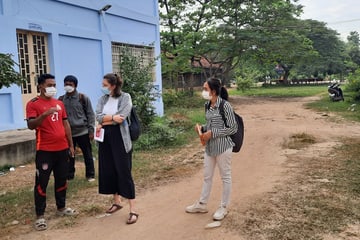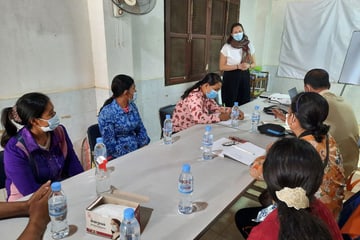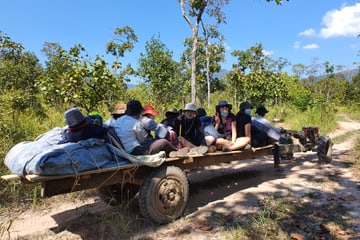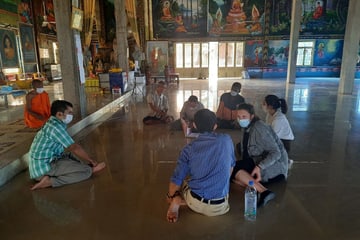"When working abroad, you sometimes have to be relaxed enough to deal with upcoming issues day by day"
Anja Hungerbuehler is doing an internship as an Innovation Capacity Amplifier with HEKS in Cambodia. In this interview, she shares what is unique and interesting with her job, the most challenging experiences during her internship, and useful tips for anyone going to work in international cooperation abroad for the first time.

Anja Hungerbuehler was chosen to participate in the SDG Youth Programme in 2021. She was recruited as a trainee for HEKS to work as an Innovation Capacity Amplifier in Cambodia. She holds a bachelor’s degree in Tourism, focusing on how tourism can support international development.
Learn more about the programme
How did you find the SDG Youth Programme?
After finishing my bachelor’s studies, it was quite tough for me to find a job or internship in international cooperation with the corona situation. In parallel, I was looking for a master’s programme. I wanted to apply for a Master’s in Innovation, Human Development & Sustainability at the University of Geneva, but on the information day, I was informed that without any previous work experience in this field, I would not get accepted. However, the advisor brought to my attention the Mercator SDG Youth Programme, which would be a great opportunity to gain practical work experience with an organisation in international cooperation.
What do you do as an Innovation Capacity Amplifier for HEKS in Cambodia?
HEKS mainly supports rural community development projects; building water canals, training smallholders in organic farming, developing local seed production and facilitating the autonomy of rural dwellers.
I assist in writing project proposals and devise innovative ways to tackle problems people are facing.
My task is to assist in writing project proposals and devise new, innovative ways and solutions to tackle problems people on the ground are facing. I am based at the headquarters in Phnom Penh, but to effectively do my job, I need to visit the villages frequently.

What was the most surprising thing you learned in Cambodia that you didn't expect before?
I’d say I didn’t expect their mobile app services to be so technologically advanced. Everything can be done electronically via your mobile phone, be it for payments or ordering an “uber tuk-tuk”. At first sight, everything seems very lively and a bit chaotic. Take traffic, for example: there appear to be no rules and total chaos, but somehow it runs smoothly, seemingly without accidents. There is a functioning system, but it’s just different to what I was used to. I had to accept it and go with the flow.
There is a functioning system, but it’s just different to what I was used to.
I also feel that people here don’t have many mental barriers. In Switzerland, when I make a suggestion or ask a question, the reply is usually a list of possible problems. Here, when I ask, “Can we do this?”, the answer is usually, “Yes, no problem!”, and they somehow always find a way to fix it. I like this mentality. My team jokingly calls Cambodia the land where wonders are possible.

What has been your most challenging experience or task so far?
Until I came here, I never realised the importance of knowing the language. Language is key – if you want a deeper understanding of the people and their challenges, or if you want to communicate with them eye to eye without barriers. I am actually the only foreigner here; my co-workers are all local staff. We have a great team, and I learn a lot from them.
Language is key – if you want a deeper understanding of the people and their challenges.
Having a local team also influences the work style at the office. I’d consider myself quite spontaneous by Swiss standards, but their spontaneity is on a different level. I never know what will happen the next day – sometimes we spontaneously have a field trip or another meeting. It makes work very interesting and somehow more unrestrained. This took some getting used to, which was initially a small challenge for me.

Do you have any tips for someone also doing this internship or working abroad for the first time?
I sometimes overthink and want to be prepared for upcoming issues, but there were so many things I couldn’t prepare for in advance for my work abroad. My recommendation is to take advantage of all the pre-internship training offered by the organisation, and be relaxed enough to deal with upcoming issues day by day. Because once I arrived, things just worked out naturally.



